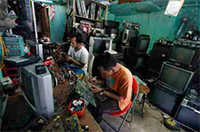Indonesia Takes Tough Stand Over Exports of Toxic Trash
by Fidelis E Satriastanti, Jakarta Globe
 |
 |
 |
 |
| |
 |
|
| |
Kino, an electronics repairman, right, and his brother restoring a damaged television on Monday. E-waste will rise dramatically in the developing world within a decade, a recent UN study said.
Reuters Photo/Enny Nuraheni
|
|
 |
 |
 |
|
| |
24 February 2010 (Nusa Dua, Bali) – As wealthy countries eye developing ones as dumping grounds for their hazardous waste, little has been done by the Indonesian government 16 years since it ratified the international chemical waste treaty.
The agreement, also known as the Basel Convention on the Control of Transboundary Movements of Hazardous Wastes and Their Disposal, seems to have been forgotten amid challenging climate change issues.
The State Ministry for the Environment said Indonesia had turned away a US shipment of hazardous waste at Tanjung Mas port in Semarang in November. The vessel was carrying nine containers of cathode ray tubes. The incident was widely reported abroad, but received little coverage by local news media.
CRT is a vacuum tube found mostly in computer and television sets. They are classified as hazardous under the Basel Convention.
Yuyun Ismawati, director of the BaliFokus Foundation, a Bali-based environmental group, said the Basel Convention was crucial because it was Indonesia’s only legal platform to prohibit dangerous waste from entering the country.
“The US containers case in November is a good example of how important this convention is,” Yuyun said.
She said that of the 22 official ports in the country, Batam and Wakatobi in Sulawesi were the main entry points for such materials from overseas.
Reports from the convention’s signatory nations suggest that there are at least 8.5 million tons of hazardous waste moving between countries each year.
Yuyun said to keep the archipelago from becoming a dumping ground for developed nations, the government must first ensure Indonesians understand the Basel accord.
“The convention is producing guidance in mostly complicated terms that commoners find hard to understand,” she said.
The Basel Convention, signed in 1989, was initially criticized by environmentalists for being too lenient. Activists, particularly those from Africa, called for a complete ban on the export of hazardous chemicals.
In 1995, the agreement was amended to mandate a complete ban, but was not legally binding because major signatories, such as Japan and the United States, refused to ratify it. Only 68 of the 172 signatory nations signed the amendment.
Imam Hendargo, the Environment Ministry’s deputy for the management of hazardous substances and waste, said there were difficulties in monitoring waste coming into the country, citing a lack of resources.
“And it is not that easy to monitor our vast coastal areas,” Imam said.
Jim Puckett, executive director of the Basel Ban Network, applauded the government for turning down the shipment in November.
He added, however, that the United States would not been penalized. “But this sends a strong signal back to the United States. Environmental protection agencies across the whole region are freaking out.”
He said that while all eyes were on climate-change issues, no one wanted to live in a contaminated world, where birth defects and cancer become epidemic.
“If we save ourselves from the climate but keep on contaminating our environment, it’s the same. We can’t ignore these issues while we work on climate change issues,” he said.
FAIR USE NOTICE. This document contains copyrighted material whose use has not been specifically authorized by the copyright owner. The Basel Action Network is making this article available in our efforts to advance understanding of ecological sustainability and environmental justice issues. We believe that this constitutes a 'fair use' of the copyrighted material as provided for in section 107 of the US Copyright Law. If you wish to use this copyrighted material for purposes of your own that go beyond 'fair use', you must obtain permission from the copyright owner.
More News
|